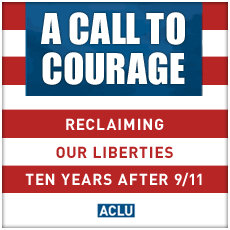
Any declaration of war has unforeseen consequences. Our government's decision to react to the events of 9/11 by declaring "war" on terrorism has posed an enormous threat to our fundamental rights and even to the structures of our democracy, as we have been told that we should just trust the government to decide what is best for us. And many innocent people have been among the collateral damage.
"...a global war approach to counter-terrorism does not make us safer. It is not too late to chart a different course, but we, and our political leaders, need to show the courage, and the will, to do so."
I wrote a book, , to recount the stories of some of those people. During the past decade, ACLU staffers have thrown themselves into public education, litigation, and lobbying efforts to challenge some of the excesses of post-9/11 anti-terrorism strategies, as the previous posts in this blog series have shown. There have been some wins and some losses (mostly when the courts have barred their doors for procedural reasons) and we have made the public aware of individual cases and efforts. But putting these stories together into a history of this decade demonstrates just what we have unleashed: the costs of employing dragnet surveillance techniques and supersized criminal laws and the dangers of allowing government agencies to act in secret without sufficient congressional oversight or judicial review.
One ACLU client, Abdullah al-Kidd, an American citizen who converted to Islam while he was in college, was arrested as a "material witness" when government agents lacked probable cause to charge him with any crime. He was detained under abysmal conditions for over two weeks and had his life derailed, but he was never called to testify at any proceeding. And the trial at which he was supposedly wanted to testify was a prosecution of a graduate student al-Kidd had known, for the crime of posting links on a website. (An Idaho jury, getting a crash course in the First Amendment at the trial, acquitted that student of terrorism charges.) Evidently, al-Kidd was deemed guilty by association with someone who wasn't even guilty.
That story received coverage in the news when the Supreme Court heard al-Kidd's case — and decided that the Attorney General should be immune from the lawsuit al-Kidd brought in the hope that no one else would have to suffer what he suffered. Less well-known is the story of Roya Rahmani, an Iranian refugee who was granted political asylum in the United States after finally being released from an Iranian jail where she was harshly punished for the crime of supporting a pro-democracy group. The United States then for supporting the same group, and she was not permitted to argue to a jury that this organization was wrongly designated as a terrorist group by the U.S., for political reasons.
But this stressful decade has created heroes as well as victims. The ACLU staff could not have litigated the constitutionality of National Security Letters (an information gathering technique available to the FBI and other agencies to use on their own initiative, without any court review) or the gag orders accompanying these demands without our clients. Two courageous internet service providers and four Connecticut librarians came to the ACLU because they were outraged at being commandeered as government agents and prohibited even from testifying before Congress about their experiences. tells what they suffered during contentious litigation lasting, in the case of one of these John Does, for over six years.
As we observe the tenth anniversary of 9/11, we at the ACLU recommit ourselves to educating the public about the costs of the "War on Terror," and we urge everyone to do the job — to ask questions about what is being done in our names and to work with us to restore our rights to liberty, privacy, due process, and equal protection.
Learn more about national security: Sign up for breaking news alerts, , and .

